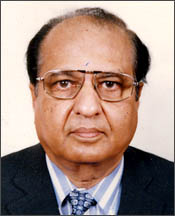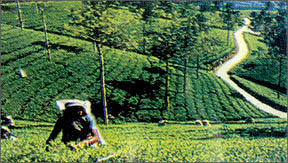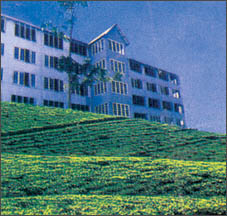Tea production to return to normal levels next month -SLTB Chairman
by L. S. A. Wedaarachchi
|

Lalith Hettiarachchi
|
The month-long plantation workers trade union action and the strike
at the end of last year adversely affected tea production in the country
and tea production has not returned to the normal levels yet.
According to the Forbes Tea Brokers Sri Lanka the 24.8 m/kgs tea
production for March 2007 reflects a decrease of 4.5 m/kgs or 16.15 per
cent compared to 29.6 m/kgs in 2006.
Sri Lanka Tea Board Chairman Lalith Hettiarachchi said that the
suspension in plucking tea leaves resulted in the "two leaves and a bud"
used in the manufacture of tea being transformed into mature,
unutilisable leaf which precipitated the dormancy of the tea bushes.
To re-activate growth the skiffing of the bushes is imperative. New
leaves sprout three to four weeks later. However, the situation was
compounded by virtual drought conditions which retarded growth further.
The Chairman said he was confident that tea production would return to
normal levels next month.
Sri Lanka produces the world's best tea and no country challenged Sri
Lanka in the world market a few years ago. The Chairman said in 2005
Kenya exported 317 m.t. to the world market surpassing Sri Lanka's No. 1
position in the world market.
|

Tea plucking |
At present Kenya is at an advantage because professional tea planters
and tea technicians who worked in Sri Lanka left the island and now they
work in the tea plantation sector in Kenya where there are no political
or ethnic disturbances.
Sri Lanka with a 137-year history in the tea industry created many
all-time records in the field of production, exports and marketing.
According to the latest reports 221,969 hectares are being cultivated
with tea in Sri Lanka.
The Chairman is planning to introduce instant tea in the near future
to the Sri Lankan market.
A survey revealed that the urban society and the younger generation
are moving away from the traditional habit of drinking tea and are
attracted by other instant drinks due to their busy schedules.
The usual practice is to brew tea leaves between three to five
minutes in boiling water. The survey revealed that some other instant
drinks became popular through multi-million rupee publicity campaigns
and increase their market shares affecting the tea market.
Hettiarachchi said that the instant tea for Sri Lanka's market
research is being handled by the Tea Research Institute (TRI) on the
request of the Sri Lanka Tea Board.
|

A tea factory |
At present Sri Lanka exports instant tea to Japan, Germany, Ireland,
Fiji Island, The Netherlands, Italy, UAE, Australia, HongKong and
Taiwan. The demand for instant tea increased sharply in Fiji Islands,
Japan, Italy and Australia last year.
"Ceylon Tea" is broadly under three categories according to the
elevations of growth; namely low grown teas, medium grown teas and high
grown teas. More than 50 per cent of Sri Lanka's teas is exported to the
Middle East and the gulf countries. West Europe imports approximately 16
per cent while East Europe is 17 per cent.
Medicinal value is attributed to tea apart from its pleasant taste
and stimulating effect. According to Dr. John Weisburger of the American
Health Foundation current research shows that tea contains powerful
antioxidants and health promoting ingredients, lowering the risk of
heart disease, stroke and certain types of cancer.
[email protected]
|
